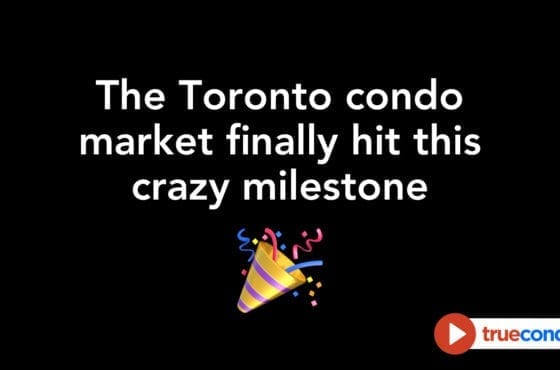Real estate slow down good for the economy?

Rosenberg: Toronto housing slowdown is good for economy
The recent dramatic drop in home sales across the Greater Toronto Area is good for Canada’s economy — and may show the economy is finally moving away from a dependence on the real estate sector, according to Gluskin Sheff Chief Economist David Rosenberg.
.jpg)
Ontario mortgage arrears at pre-‘90s-crash levels—report
Late payments of mortgages in Ontario have declined to their levels back in 1990, just before the real estate crash that led to a massive growth in the number of delinquencies.

New condo supply falls to 15-year low
Urbanation, the authority on the Greater Toronto Area’s (GTA) new condo market statistics, released its second quarter 2017 (Q2-2017) report, announcing that the new condo market is still surging as the resale condo market moderates. Also, new condo supply has fallen despite record high launches.

Buyer who walked away from real estate deal ordered to pay $360K
Would-be buyer ordered to pay the difference after house ultimately sells for 28% less

You can walk away from your mortgage (if you live in Alberta), but should you?
Handing over the keys to the house and walking away from your mortgage, called ‘jingle mail,’ was a defining act of the American housing crisis. The problem is it can happen here, namely in Saskatchewan and Alberta
TRANSCRIPT
Andrew La Fleur: Today is Tuesday, August the 15th, and this is what’s happening in the condo market this week. Thanks for checking out this video once again. If you like these videos, if you like these podcasts that you’ve been getting from me, if you can go ahead and share it, if you can leave a review on iTunes, if you can hit send and send it to somebody else that you know, or share on Facebook, or like on Facebook, that would be great. It really helps to get the word out about these shows, and these videos, and these podcasts. Helps other people get access to the information, as well.
As we jump into the first article for this week, it is from BNN. It’s an interview, a video interview, and an article with David Rosenberg. He’s an economist, senior chief economist. The headline says “Toronto Housing Slowdown is Good for the Economy.” This is sort of a contrarian headline and catched a lot of people maybe by surprise this week.
The point is, it’s valid. It’s something that we’ve talked about on this show a lot, is this idea that the slowdown that we’re seeing in the low-rise housing market … Again, condo market is very different. Condo market hasn’t really changed much at all. It’s still at all-time highs, and prices are still rising very rapidly. Supply is still very low in the condo market, but in the low-rise housing market, it’s obviously slowed down a lot over the past few months.
The news here, again, and what we’ve been hitting home on is it’s a returning to normal. We’re going back to a more normal place to be, and that’s a good thing. This is, again, something that Rosenberg is also hitting on, where we hear some of the quotes from the article. Yeah, again, just basically talking about how it is coming back to more of a normal level, and the unsustainable rises were not a good thing, and we should be happy that things are in fact going down to what is a more sustainable market. He’s making it very clear he doesn’t think that the market is crashing, is spiraling, is going to go down with any significance. It’s just a market that’s correcting itself. After having gone up a lot, it’s now coming down.
The next article that I wanted to bring to your attention is … You might have caught this. It was actually from a couple weeks back, but some statistics came out about the mortgage arrears, people who are late on their mortgage payments, in Ontario. They’re basically at the lowest levels, mortgage arrears, people late on their payments, are at the lowest levels they’ve been in 27 years, 27 years. Again, this is another indicator of the health and the strength of the market, the fundamental structure to the market.
Are we in a bubble or not? This is one of the things that you should always look at is, are people late on their payments? Are we witnessing anything like what we saw in the US in the run-up to their major housing crash, where mortgage delinquency rates soared. We’re not. In fact, we’re seeing the opposite. Mortgage arrears are at 27-year lows. This is the lowest of all the years they have on record of tracking this. This is the lowest number they’ve ever seen.
The number is 0.11%, so roughly a tenth of a percent. One out of 1,000 mortgage holders in Ontario are behind on their mortgage payments. One out of 1,000, so if you look at your neighborhood, if there’s 1,000 homes in your neighborhood, one person maybe is in arrears. Again, at the peak of the US crash in some of these really terrible areas and terrible neighborhoods, where things were going down really quickly, that number was into double digits, 10%, 15%, 20%. This is a tiny, tiny fraction of that sort of a number, and all indications are it’s been flat. It’s been flat for a number of years, so that is good news, and again, it speaks to the strength of our mortgage market in Ontario.
Next article, new condo supply falls to 15-year low. This is from the Neumann Homes’ blog. Again, this is from Urbanation data, Urbanation data for the second quarter, which they put out in the past week or two. This is another headline I want to make sure you see and understand. This 15-year low, so out of … Where are we here? Out of 110,000 … Where is it here? Sorry, bear with me, 110,000 active units in the greater Toronto area, 94% of them are sold, leaving an unsold inventory of just 6,700 homes. This is the lowest new condo supply there has been in 15 years and equals to two months of supply. This is, again, the lowest level in 15 years. Inventory supply levels are at an incredible low point for condos in the GTA.
A big reason for that, on the one hand, is that there has been such a high volume of sales in the past 12 months. Roughly around, I think, 35,000 units or so, sold in the past 12 months, which is higher than the typical average of around 20,000, 25,000 units. Sales are up. Prices are obviously up. New projects are coming out, but they can’t keep up with the demand. New projects come out, they sell out right away. If you’re a buyer out there looking to buy something right now, as I talk to buyers every single day, it’s very hard. There’s not a lot of choices to choose from.
A year, two years ago, if you came to me and said, “Andrew, I’m looking for a great condo investment. What have you got for me?” I’d easily lay out to you three, four, five good options that you could choose from immediately. Right now, that number is, as of today, recording this podcast, is basically zero. We are waiting for new product to come onto the market that is a good opportunity for investors to get into. I have some great stuff coming this fall, but right now, there’s very slim pickings, especially in the downtown core. That is the condo market right now.
The next article, buyer who walked away from real estate deal ordered to pay $360,000, would-be buyer ordered to pay the difference after house ultimately sells for 28% less. This is from out in Surrey, BC. Somebody entered into a contract to purchase a property for $1.26 million. This was a year ago at the height of their market, before their foreign buyer tax came in. The foreign buyer tax came in, market slowed down significantly. The buyer got scared. The buyer backed out of the deal. They did not close on the deal, so the sellers ended up putting the property back on the market and selling it for $360,000 less than that price, many months later. Now they went to court. Obviously they sued, and they have to pay the difference.
This is a very important learning point for every real estate investor, or anybody involved with real estate in Canada, is to understand this concept that a contract is a contract. If you enter into a contract to purchase, you must follow through on that. There’s no walking away, there’s no … A lot of people have this misconception that, “You can just keep my deposit, and I’ll just walk away, and we’ll call it even. Shake on it, see you later.” That’s not how it works. A contract is a contract. You are obligated to pay that price. If that price is not paid by you, then the seller is open to sell it to someone else, and you, the original buyer, have to pay damages. You have to make them whole. You have to make them come up to the amount that they would’ve received if you had to close on your deal. That’s something a lot of people don’t understand and seem to take for granted.
This buyer obviously got some very bad advice, and they decided to talk away from this. Interesting enough, now that the market in BC has rebounded, if they had to have just stayed in that deal and closed on it, and then just simply sold the property today, they probably would’ve been much, much better off. Maybe they wouldn’t have come up all the way to the price they paid, but they certainly wouldn’t be out $360,000. It might be … I don’t know what the number is. We can look into it, but I’m sure it’d be much, much less than $360,000, as the market has rebounded. They got cold feet. They thought the market was going to tank. The market didn’t tank. The market slowed down for a little bit, and now the market is flying again.
And finally, this tying into the articles about the mortgage arrears and walking away from your contract, another difference between Canada and the US, which is important to understand, is this idea of non-recourse versus recourse mortgages. A big problem in the US with the crash there, they had these non-recourse mortgages, where a lot of buyers were simply walking away from their houses. They stopped making mortgage payments. Mortgage arrears, we talked about that. They just simply walked away, “Okay bank, you can have the place. It’s yours. I’m out of here” kind of thing. A lot of the states in the US, Florida and others, you could do that.
Pretty much everywhere in Canada, with the exception of Alberta, and I’ll include a link to this article here, which is from a couple years back, but it’s great in explaining recourse versus non-recourse mortgages, how they work, how you can do it in Alberta under certain conditions, but you can’t do it obviously in Ontario. You can’t simply walk away from your mortgage. It’s another reason why our market is fundamentally strong, why our lending system is fundamentally different from what’s gone on in the US, and why our market is not going to crash in the way that the US market ever did. It’s just simply not going to happen, and those people who think that this is our time, just like it was in the US, are completely and totally misinformed.
Okay, I hope you enjoyed this video. Check out the links that I sent you here. Until next time, have a great week, and happy investing.



